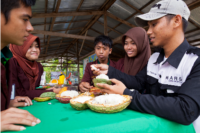
|
Norman Love Confections’ newest chocolates are more than just a delicious treat — they’re also part of the candymaker's plans to help cocoa farmers.
The line features six chocolates, each of which was chosen for their unique flavors and commitment to sustainability including the rare Nacional from Peru’s Marañón Canyon, Fortunato No. 4.
And, when consumers purchase these chocolates, NLC will donate a portion of the proceeds to the Rice Stove Project, a program whose mission is to build specially designed rice stoves for those who live in the cacao-rich Marañón Canyon of Peru.
“Just as we work to help improve lives in our own community, we want to help improve living conditions for those who work to provide such wonderful ingredients and yet lack basic necessities and live with serious health hazards,” says Norman Love.
A few thousand people live in this remote region of Peru, where residents have few creature comforts, but the fertile soil allows wild coffee, cacao and tropical fruits to grow in abundance.
Today, 5,000 farm families live in the canyon, which can only be reached by barge or long boats that cross the river.
While farmers grow many crops and those who grow cacao are proud of the Pure Nacional that Peru considers a national treasure, another crop grows there that threatens the residents’ existence: rice.
Brought to the canyon years ago through a government subsidy, farmers now struggle to make a profit on this non-native crop, which leaves behind stacks of rice hulls up to 40 feet high. The hulls naturally contain silica, which can damage lungs. When the temperatures rise, the mounds spontaneously combust and smolder for weeks, sending silica-laden smoke throughout the area, endangering the health of the residents.
Simple rice stoves, designed by a Canadian nonprofit organization, can burn the husks safely. The free and readily available husks burn hotter and faster than wood which is expensive and rare in the canyon and creates more smoke and slower cooking times. Reducing the dependency on wood also helps with the prevention of rainforest deforestation.
A stove costs $60 to make. And, Dan Pearson, co-founder and president of Marañón Chocolate, and his business partner, Brian Horsley, are working with the nonprofit organization, Discover Hope, to purchase and build rice stoves for the farmers. They have raised enough money so far to build 200 stoves using materials sent from European-based donations. The goal is to eventually supply all 5,000 Marañón Canyon families with a stove.
In an effort to speed up the progress of the Rice Stove Project, Norman and Mary Love have made a financial contribution that will provide funds to build stoves now.
However, when the harvest season begins in November, farmers will not have the time to construct the stoves. So, proceeds from Love’s Origins line will provide funding for stoves for next year and beyond.
Maura Metheny, chef chocolatier and head of design and innovation for Norman Love spearheaded the project.
“Supporting this product is about bettering the lives of the workers and conditions of the plantations that make our business possible,” she says.
The Love Origins line includes:
► Alto el Sol 65 percent, from Peru is sourced from eight small family-owned plantations in the San Martin region, Peru’s richest biological area. Long-term contracts for an entire harvest ensure an income for farmers and encourage sustainable harvesting practices. Farmers work with a United Nations-funded co-op created to increase the farmers’ quality of life and protect their livelihood. The beans are shipped to the upper Normandy region of France and manufactured with organic sugar, vanilla, and 100 percent traceable and fair trade beans at Barry Callebaut facilities in Meulan, France.
► Hacienda Elvesia 74 percent from the Dominican Republic features certified organic and Rainforest Alliance certified beans. Swiss immigrants cultivated this cacao more than 200 years ago and the same family runs the plantation today. Using rare and highly prized Criollo and Trinitario beans, which are carefully hand sorted, the family has focused on developing a sustainable system of farming in harmony with nature, resulting in unparalleled quality beans, which are shipped to Felchlin in Switzerland for manufacturing with 100 percent organic ingredients. The company also provides housing for the families of workers, many of whom were displaced by natural disasters in Haiti.
► La Red 70 percent, from the Dominican Republic, is manufactured by Fruition Chocolate in the Catskill Mountains, N.Y. Made from USDA certified organic beans from the La Red co-op, which is made up of 300-plus small cacao farmers who share a centralized processing center for fermentation and drying. Profits from sales to U.S. premium chocolate makers have allowed the co-op to invest in additional solar drying capabilities, an enlarged storage warehouse, a cacao nursery full of seedlings and a five-tier fermentation facility. Farmers are paid 30 percent more than Fair Trade prices, enabling them to better their lives.
► Tainori 64 percent, from the Dominican Republic, is named for the people on the island when Columbus arrived. It’s made from Trinitario beans. The plantation, owned by a local family, is a living laboratory for research and exploration in sustainable farming by converting plantations into botanical gardens that re-establish the balance between flora and local ecosystems. Studies are underway to strengthen trees for continued production and projects to improve life for farms and their residents. Long-term contacts with local workers ensure continued quality of life for farmers. The chocolate is manufactured by Valrhona in France, which supports local communities, including co-funding a school that opened in January 2013.
► Fortunato No. 4 68 percent from Peru has been DNA-certified as the original cacao. Marañon Chocolate partner Brian Horsley lives and works in the canyon with the farms to harvest, ferment and dry the beans and oversees the exportation from Lima. The chocolate is manufactured by Swiss-based Felchlin. The Marañon company is heavily involved with helping to improve the lives of families locally and cacao initiatives through the Rice Stove project as well as initiatives to preserve the future of cocoa worldwide. Local farmers in the canyon are paid 100 percent cash for wet beans. Horsley works with farmers on sustainable ways to trim trees, increasing yield and preventing insect damage.
► Bolivian 87 percent comes from a small co-op in Bolivia’s Alto Beni province. Farmers use sustainable farming methods to cultivate wild Bolivian Nacional cacao and hybrid seedlings and plant new acreage to ensure future production. Taza Chocolate in Boston purchases the beans for $500 per metric ton more than the Fair Trade customary price and publishes an annual report for growers of volume purchased and prices paid. Taza stone grinds the beans using hand-carved granite millstones, in the Mexican tradition, to create a bolder texture and flavor. The chocolate is manufactured with 100 percent organic sugar and Costa Rican vanilla.
The Origins chocolates will feature 10, 3.5-gram squares per sleeve, with six sleeves per set, one of each variety. The sets will retail for $26.
Norman Love Confections creates and distributes handcrafted artisanal chocolates from the Fort Myers corporate headquarters that encompasses both production and retail operations.





